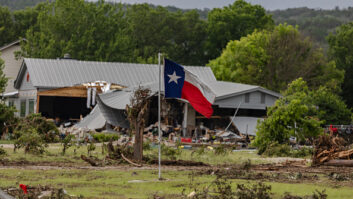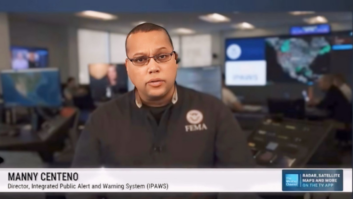WASHINGTON: Some broadcasters and emergency management officials are asking whether government should have an increased role in keeping radio stations on the air “at all costs” during catastrophic events.
The recent hurricanes along the Gulf Coast sparked the debate.
Who ultimately is responsible for broadcaster preparedness is not a matter of debate, according to sources familiar with public warning. Broadcasters must spend the resources to build redundant operational systems and develop emergency plans, they say.
However, some emergency communications experts have wondered if broadcasters should be given “first responder” status, similar to that granted public safety departments. The designation would give stations special privileges such as guaranteed access to diesel fuel and emergency generators.
Such a move would be unprecedented, they believe.
Emergency management sources interviewed for this article agree that broadcasters played a critical role disseminating lifesaving information to thousands of civilians stranded in New Orleans and other Gulf Coast cities and listening to radios, often portable radios.
Who’s special?
Also at issue is which federal entity should be responsible for granting broadcasters such special privileges.
Is this a matter for the Federal Emergency Management Agency, or the FCC? Others believe the National Communications System, which operates under the auspices of the U.S. Department of Homeland Security and is responsible for maintaining telecommunication infrastructure during emergencies, should take responsibility.
Jackie Lett, president of the Mississippi Broadcasters Association, said broadcasters in that state will approach the Department of Homeland Security and the Mississippi state legislature in early 2006 to discuss “first responder” status for stations.
“I believe our broadcasters should have been allowed access to diesel fuel, which was in short supply after Katrina hit,” Lett said. “We heard horror stories … even police commandeering a fuel delivery truck headed to a transmitter site because they needed it elsewhere urgently. Making sure we will be allowed into restricted areas to repair facilities is also a major concern. The goal is to seek assistance to remain on the air.”
How to determine which broadcasters would receive diesel fuel and other government support during emergencies could be a complicated matter, said Don Jacks, FEMA public affairs officer.
“My initial thought would be, ‘Who gets fuel and who doesn’t?'” Jacks said. “Who would decide if it’s the top news station in town or a country music station?”
Regardless, Jacks doubts FEMA would attempt to determine such a policy since it is not a regulatory agency. “We can’t do that and don’t expect to. I would imagine the FCC would be interested,” Jacks said.
An FCC spokesman declined to comment specifically on the possibility of future rulemaking to make such changes.
At the NAB Radio Show, FCC Commissioner Jonathon Adelstein said in general about disaster response and communications, “We have to be on the job and allow broadcasters any flexibility they need to respond.”
Coincidently, the FCC’s review of proposed changes to EAS rules, released August 2004, continues. Potential changes are based in part on the recommendations of the Media Security and Reliability Council, an FCC advisory committee and the Partnership for Public Warning, which ceased operations earlier this year. Sources said they expected the FCC’s work on the EAS Notice of Proposed Rulemaking to be completed in 2005, but that was prior to the hurricanes.
The federal government has provided generators and large fuel tanks to the 34 radio stations that are part of the country’s EAS Primary Entry Point network, said Mark Manuelian, president of the Primary Entry Point Advisory Committee.
Hardening stations
The PEP system allows the president to issue an Emergency Alert Notification and address the American public during an emergency. Entercom’s WWL(AM) in New Orleans is a PEP station and managed to remain on the air after Katrina.
“There is added focus on emergency information in light of Katrina; and FEMA has asked PEPAC to advise them on the feasibility of hardening key stations in areas at risk for major natural disasters, the intent being to keep those stations operating through the event and for the recovery period,” Manuelian said.
The 34 current PEP stations in the country reach approximately 90 percent of the continental United States, plus Hawaii, Alaska and Puerto Rico, said Manuelian, who said that 26 stations are being added to the PEP network over the next year to ensure a larger broadcast coverage area.
“I don’t consider broadcasters as first responders in the sense that they respond to the scene of a disaster. Certainly they are part of the critical communications infrastructure,” said Van Schallenberg, who served on the now-defunct EAS National Advisory Committee and works in homeland security support for the Oklahoma County Sheriff’s Department.
Schallenberg said it’s unclear whether the federal government would want to part with a percentage of its response resources for a major event in order to support broadcasters.
“How do they balance fuel for critical government needs against those of the broadcasters who are important because of the numbers of people they can reach?” Schallenberg said.
Bill Croghan, co-vice chair of the Nevada EAS Committee, said, “I doubt all radio stations should be included” if broadcasters do receive government assistance, although “I would think the LP1 and LP2 and any local powerhouse signals would be included.
“Having first responder status assumes that these broadcasters would be useful and not just some boondoggle to get their commercials back on the air. I think you could run the risk of some broadcasters claiming special treatment,” he said.
EAS vs. PDAs
Some broadcasters may decline the government’s help during an emergency to avoid political and regulatory complications, said Art Botterell, former trustee for PPW.
“There is a natural tendency for broadcasters to keep a distance from government and the matter of journalistic independence. Broadcasters do things to minimize the impact on the bottom line,” Botterell said in an e-mail response to a Radio World inquiry.
Peter Ward, former chair of the board of trustees for PPW, said he agrees radio played a crucial communications role in the aftermath of Katrina, but made another point: Some emergency management managers view EAS and radio in general as less important thanks to newer emergency information delivery technologies, such as PDAs and cell phones.
“There are some differences that have to be talked through yet by a lot of parties. Radio certainly is in there when it come to emergency warning. The lack of local communication capability in New Orleans was shocking, really,” Ward said.
If radio were to be considered part of the first response team someday, Karole White, Michigan Association of Broadcasters President/CEO, thinks broadcasters would be taken more seriously.
“Maybe then we wouldn’t have to push emergency responders so hard to include us. Until lately, broadcasters have been kept on the outside too often,” White said.






